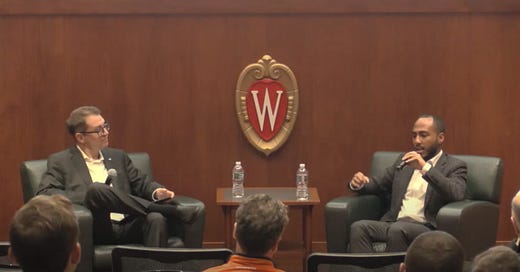Scholar Argues Against DEI Programs At UW-Madison
Former Manhattan Institute fellow Coleman Hughes recently spoke on campus
In a recent event hosted by the Tommy G. Thompson Center on Public Leadership, scholar Coleman Hughes argued in favor of a “colorblind campus,” saying that “we should try our best to treat people without regard to race.”
He said he grew up in an upper-middle-class home ten minutes away from Columbia University, where he later attended college. Throughout his youth, he lived in a “colorblind” community where race didn’t matter. However, that changed when he started college. During an early event at the university, he and other classmates were immediately divided by race for a group activity.
Throughout his college experience, Hughes said he was encouraged to separate from his white classmates. He was even allowed to have a separate graduation from his white counterparts. This experience sparked Hughes to fight against what he considered a new, different form of racism.
He harshly criticized diversity, equity, and inclusion (DEI) programs, citing a recent article from The New York Times that showed “every problem the DEI bureaucracy is built to solve got worse as the [University of Michigan] expanded DEI.”
He said the U of M had about 250 DEI staff whose jobs were to “find the racism,” which he compared to hiring a “ghost hunter” who would always “find” a ghost despite it not being there.
Hughes was asked whether his worldview had been influenced by growing up in an upper-middle-class household. However, he defended his views by pointing out that two of the most famous black thinkers, Thomas Sowell and James Baldwin, grew up in the same neighborhood, but ended up with completely different political views.
He also defended the legacy of the founding fathers, claiming they were the first to truly create a political system with liberty. He cited the sin of slavery as hypocrisy, but not a uniquely American problem.
He also praised capitalism in response to a question asking whether class differences need to be acknowledged, saying, “I think because of our…aversion to politics of class…that our economy and our growth has remained robust enough to be attractive…to the poor of the world.”
Hughes is critical of policies that aim for equality of outcome, claiming “no society in history, nor any society in the future, will ever achieve this fantasy that is held up of so-called equality of outcome.” To prove his point he showed that different white ethnic groups have high inequality in terms of income.





